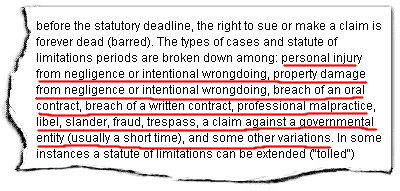What is Statute of Limitations?
The Statute of Limitations is the maximum time limit for a creditor to file a lawsuit in federal courts to claim the outstanding amount against a fraudulent debtor. If the lawsuit is not filed within the stated time limit, the creditor will loose the right to claim or sue for it forever. That means the debt collector will no longer have any right to sue you for payment of old debt. If a debt collector still threatens to sue you, he will be punished for violating the Fair Debt Collection Practices Act. Usually the SOL time limit lies between 3-10 years after the moment you signs up a credit contract or the last activity date written on your credit report.
The purpose of the Statute of Limitations is to ensure that a debtor will not worry about being sued by the creditor for the rest of his life and he gets a chance to defend himself with new evidence. This does not ensure that a creditor will not be able to sue you. If a creditor does that, you can ask the judge to dismiss the case on the ground of expired time period. The Statute of Limitations does not hold for certain type of debt such as Federal Student loans, most types of fines, past due child support (depending on states).
The statute of limitations on debt depends upon the following:
- The amount of debt you owe.
- Your State's civil debt collection code.

What are the types of debt contracts on which an SOL is effective?
The chart below depicts the Statute of Limitations in different states of the United States. If you want to know specific details on any account, you can contact your State's Attorney General Office.
How does the Statute of Limitations protect debtors?
Creditors would like to pursue debtors for the money they owe for as long as possible. With an SOL in effect, debtors are protected from indefinite lawsuits filed by creditors. How the creditors report to the Bureaus also controls an individual’s credit score. The SOL has been made effective to protect debtors from long term damages to their credit reports by setting time limitations to the negative information reflecting on the credit report.
Here are 2 ways by which debtors may be protected:
-
Time limit:
All negative information has a time limit up to which it can be reflected on an individual’s credit report. After this limit is up, those negative information are supposed to come off the report. Although the time for which these information can stay on your report is relatively long, you may get them removed by paying on your debts and not defaulting.
Generally negative information can be reported for 7 years. However, there are certain exceptions, like:- Bankruptcy can be reported for 10 years.
- Information related to any legal action or a judgment against the debtor may be reported either for 7 years or till the SOL expires, whichever is longer.
- Tax liens remain on your report for 7 years from the sate they are paid.
-
Expiry of SOL:
The FDCPA states that if you have a debt that is past the SOL in your state, you need not pay it back. However, whether or not you choose to pay depends on you as a debtor. Once the SOL is over, you are not legally required to pay back the money. You must remember that, if you do pay on that debt, it will have the SOL restarted.
Debtors should be aware of their rights. Check the SOL in your state to be protected from harassing collection calls.
Abstain from reviving your old debts
Here are the 4 tips that can help refrain from giving a new lease of life to the old debts:
- Be careful when you talk about your debt with the collector:
If you get a call from a debt collector on a Monday morning, talk carefully. Don't reveal any debt or financial details to the collector beforehand. If the collector is talking about a debt which has crossed the SOL period, it is advisable to not acknowledge the debt. Once you admit that the debt is yours, the SOL clock will restate again. The collector will ask you several questions regarding debt. Give a negative answer to most of them. Tell him that you are hearing about the debt for the first time. It is not your debt. Ask several questions on the debt and collection agency to the collector instead. Try to make the collector confused.
- Remember the default date on the debt correctly
Negative items such as delinquent debts can appear on your credit report for only 7 years. Very few people are aware of this fact. The creditors/collectors are required to wipe out the items after the expiration of 7 years. Under federal laws, the creditors/debt collectors are forbidden from manipulating the account numbers. Neither can they re-age the account. However, the creditors/collectors can refuse to remove judgments from your credit report until it expires.
- Do not hesitate to forward a cease and desist letter
Are you getting several collection calls in the last few days? Did you not tell the collector to stop calling you simply because you are afraid that it will be regarded as admission of debt? If yes, then you are wrong. Under the FDCPA laws, you can tell the collector to stop communicating with you. All you need to do is ask the collector to validate the debt in writing. If the collector fails to comply with your request, then you can forward a Cease and Desist letter to him. Henceforth, the collectors won't be able to disturb you again.
If the debt collector calls you after receiving the Cease and Desist letter, then you can very well sue him. On the other hand, if the collector sues you, then you can defend yourself against the allegations made by him.
- Refrain from making a partial payment on the debt
If a debt collector tells you that you can get rid of debt by making a partial payment, don't fall for it. Once you make a partial payment on an old debt, the SOL clock restarts. So, make a detailed research prior to signing a written agreement with the debt collectors. Find out the SOL period in your state from the State Attorney General. You can also browse different websites and check out the SOL period in your state. If you have loads of debts, then you need to check the SOL period in your state. This will help you determine which debts you should pay first. For example, you can work towards eliminating the debts which have not crossed the SOL period.
Last but not the least, if the creditor/debt collector has filed a lawsuit against you in the county court even after expiration of the SOL period in your state, you can take legal action against him. Gather all the relevant documents, and submit them to the court as proof that the debt has crossed the SOL period. If the judge finds that the debt has crossed the SOL period, then the case will go in your favor. Make sure you inform the judge that the debt is over the SOL period. Otherwise, the court may issue judgment on the expired debt and you'll be forced to pay back your creditors/collectors.
Statute of Limitations Chart
| State | Written Contracts | Oral Agreements | Promissory Notes | Open-ended Accounts |
| Alabama | 6 | 6 | 6 | 3 |
| Alaska | 6 | 6 | 6 | 6 |
| Arizona | 6 | 3 | 5 | 6 |
| Arkansas | 5 | 3 | 6 | 3 |
| California | 4 | 2 | 4 | 4 |
| Colorado | 6 | 6 | 6 | 6 |
| Connecticut | 6 | 3 | 6 | 6 |
| Delaware | 3 | 3 | 6 | 3 |
| D.C. | 3 | 3 | 3 | 3 |
| Florida | 5 | 4 | 5 | 4 |
| Georgia | 6 | 4 | 6 | 4 |
| Hawaii | 6 | 6 | 6 | 6 |
| Idaho | 5 | 4 | 10 | 4 |
| Illinois | 10 | 5 | 6 | 5 |
| Indiana | 10 | 6 | 10 | 6 |
| Iowa | 10 | 5 | 5 | 5 |
| Kansas | 5 | 3 | 5 | 3 |
| Kentucky | 15 | 5 | 15 | 5 |
| Louisiana | 10 | 10 | 10 | 3 |
| Maine | 6 | 6 | 6 | 6 |
| Maryland | 3 | 3 | 6 | 3 |
| Massachusetts | 6 | 6 | 6 | 6 |
| Michigan | 6 | 6 | 6 | 6 |
| Minnesota | 6 | 6 | 6 | 6 |
| Mississippi | 3 | 3 | 3 | 3 |
| Missouri | 10 | 5 | 10 | 5 |
| Montana | 8 | 5 | 8 | 5 |
| Nebraska | 5 | 4 | 6 | 4 |
| Nevada | 6 | 4 | 3 | 4 |
| New Hampshire | 3 | 3 | 6 | 3 |
| New Jersey | 6 | 6 | 6 | 6 |
| New Mexico | 6 | 4 | 6 | 4 |
| New York | 6 | 6 | 6 | 6 |
| North Carolina | 3 | 3 | 5 | 3 |
| North Dakota | 6 | 6 | 6 | 6 |
| Ohio | 15 | 6 | 15 | ? |
| Oklahoma | 5 | 3 | 5 | 3 |
| Oregon | 6 | 6 | 6 | 6 |
| Pennsylvania | 6 | 4 | 4 | 6 |
| Rhode Island | 15 | 15 | 10 | 10 |
| South Carolina | 10 | 10 | 3 | 3 |
| South Dakota | 6 | 6 | 6 | 6 |
| Tennessee | 6 | 6 | 6 | 6 |
| Texas | 4 | 4 | 4 | 4 |
| Utah | 6 | 4 | 6 | 4 |
| Vermont | 6 | 6 | 5 | 6 |
| Virginia | 5 | 3 | 6 | 3 |
| Washington | 6 | 3 | 6 | 3 |
| West Virginia | 10 | 5 | 6 | 5 |
| Wisconsin | 6 | 6 | 10 | 6 |
| Wyoming | 10 | 8 | 10 | 8 |
Statute of Limitations on Judgments
The question of judgement comes up when a creditor files a lawsuit to recover the outstanding amount from the debtor. They must sue the debtor before the SOL time limit expired. At this time, the court will contact you via mail. The creditor will need to proof that the debt is actually owed. Once judgement is passed, the creditor has every right to seize your assets, bank accounts or garnish wages.
| Statute of Limitations on Judgments | ||
| State | SOL (Years) | Maximum Interest Rate (%) |
| Alabama | 20 | 12 |
| Arkansas | 10 | 10.5 |
| Alaska | 5 | 10 |
| Arizona | 10 | Fed + 5 |
| California | 10 | 10 |
| Colorado | 20 | 8 |
| Connecticut | 20 | 10 |
| Delaware | No Limit | Legal + Fed Discount + 5 |
| D.C. | 3 | 70% of interest rate or 6% if not specified |
| Florida | 20 | 10 |
| Georgia | 7 | 12 |
| Hawaii | 10 | 10 |
| Iowa | 6 | 10.875 |
| Idaho | 20 | 9 |
| Illinois | 20 | 8 |
| Indiana | 20 | 10 |
| Kansas | 5 | 4% above Fed Discount |
| Kentucky | 15 | 12 |
| Louisiana | 10 | 9 |
| Maine | 20 | 7.5 |
| Maryland | 12 | 15% if under 30 months, T-bill rate if over 30 months |
| Massachusetts | 20 | 10 |
| Michigan | 10 | 20 |
| Minnesota | 10 | 6.953 |
| Mississippi | 7 | 5% changes yearly |
| Missouri | 10 | Amount in contract |
| Montana | 10 | 9 |
| North Carolina | 5 | 10 |
| North Dakota | 6 | 1% above bond equiv Yield |
| Nebraska | 20 | 2% above Prime |
| New Hampshire | 20 | 10 |
| New Jersey | 14 | No provisions |
| New Mexico | 20 | 8.75% without written contract |
| Nevada | 10 | 9 |
| New York | 10 | 8 |
| Ohio | 21 | 12 |
| Oklahoma | 5 | 10 |
| Oregon | 10 | 4% over T-bill |
| Pennsylvania | 4 | 9% renewable @10 yrs |
| Rhode Island | 20 | 6 |
| South Carolina | 10 | 12 |
| South Dakota | 20 | 14 |
| Tennessee | 10 | 10 |
| Texas | 10 | 10 |
| Utah | 8 | can be 18% w/Agreement or 6% without |
| Virginia | 8 | Judgement Contract Rate |
| Vermont | 20 | 12 |
| Washington | 10 | 9 |
| Wisconsin | 10 | 12 |
| West Virginia | 20 | 10 |
| Wyoming | 5 | 12 |
The information is given above is believed to be correct at the time of creation of the page and is for reference purpose only. If you find any information incorrect, you can get it verified with your state Attorney General.


